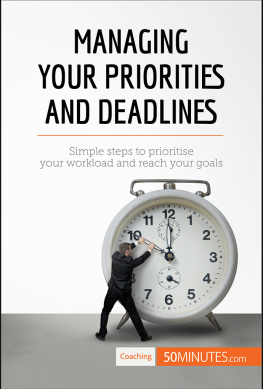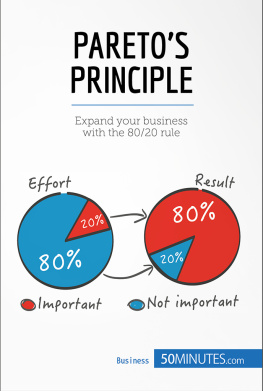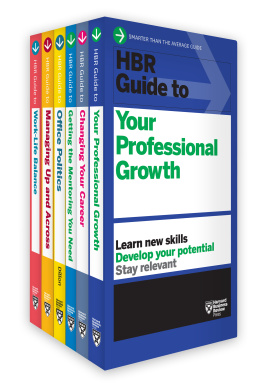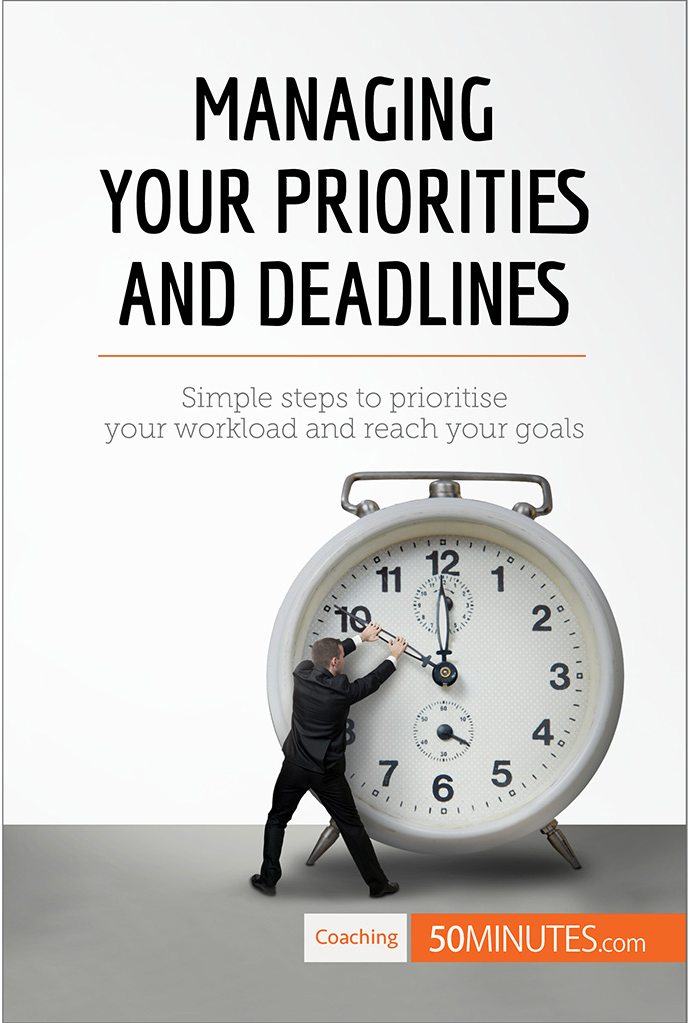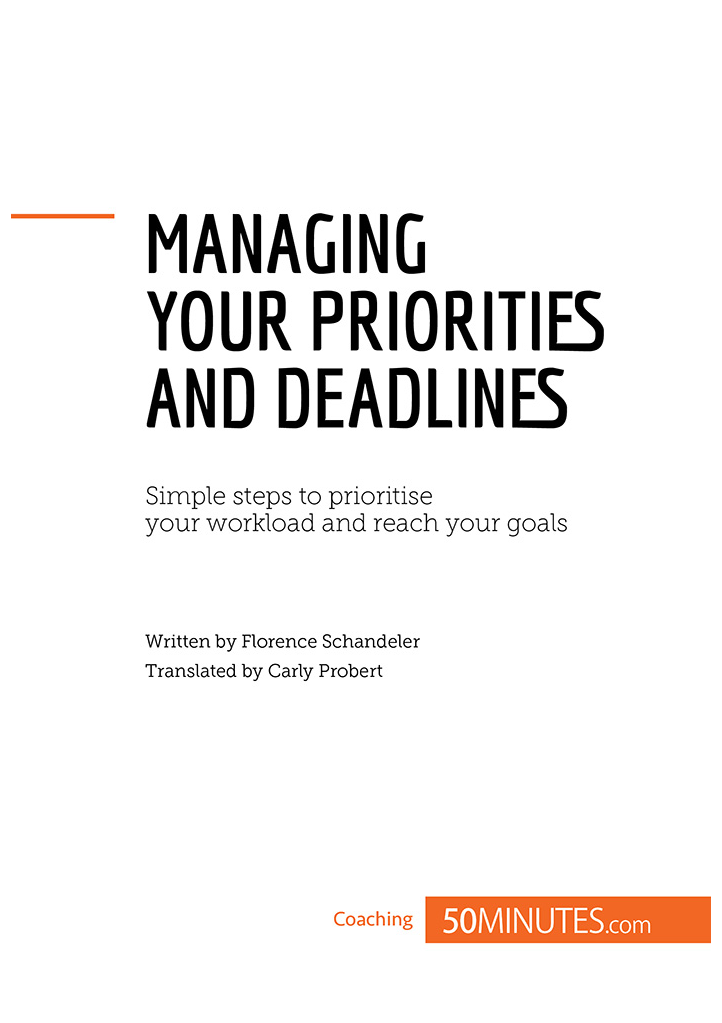How to manage your priorities and deadlines
- Problem: How can I set priorities and get organised in order to make the most of the time I spend at work?
- Uses: Knowing how to choose priorities and manage your schedule to complete tasks within the set limits. Never losing sight of your objectives or wasting energy, saying Ill never have the time, but planning and taking action.
- FAQs:
- How can I get rid of time-consuming habits?
- How can I plan the tasks I need to get done?
- How do I set priorities?
- How should I organise my schedule?
- How can I stop procrastinating?
- How do I delegate successfully?
- How can I disconnect from work once Ive left the office?
With the arrival of the internet and new technology, the rhythm of life seems to get faster and faster. Nowadays, we live in a society where the words speed, competition and stress are everywhere. Laptops and smartphones have made us available 24 hours a day. This means that the line between our professional and private lives has become more and more tenuous for both employers and employees, as they cannot avoid their inbox. Doctors have also noted that the number of people suffering from burnout is increasing.
Time is money. How many times have we heard this expression, forcing us to speed up and dive headfirst into the pile of folders stacked on our desks? This focus on speed and our hyper-connected world prevent us from maintaining the distance necessary for reflection and questioning of the way we work. Many of us have become accustomed to working under pressure, being conscious of never having enough time, and cursing the days when 24 hours just arent enough.
Dont wait any longer before reading this book by investing just 50 minutes of your time, you will be able to reflect on the way you work and how you manage your time. We will present some theoretical models that highlight the phenomenon of the lack of time and explain why it is important to change some of your habits in order to emerge victorious. Then we will look at how you can develop an optimal work schedule that will take into account your job priorities and deadlines, so that you can be efficient when you take action.
Time management: the basics
Analysing the I dont have time phenomenon
Symptoms
Food for thought: Those who make the worst use of their time are the first to complain of its brevity. La Bruyre (1645-1688)
We have all suffered on different levels from a lack of control over time. When we get down to work, we often do not notice the time passing or we run around all day without being able to complete our paperwork.
- We rush our work and feel that we are missing the essential points.
- We accept delegated work from our superiors without being sure if we can finish it.
- We feel like we are wasting time by helping a colleague who is seeking advice and by answering dozens of emails.
- There is still a whole pile of paperwork to get throughbut what have we done with our day?
- So, we have no choice but to take the work home to get it done in time.
This realisation drops like a bombshell: we do not have time. Yet, at the risk of stating the obvious, a day will always have 24 hours, eight to ten of which are devoted to professional obligations for many workers. This is a reality that must be acknowledged, so we should learn to understand all its aspects and take advantage of it.
As it would be cynical and counterproductive to imagine the contrary, we should believe that every problem has a solution and put some of our time to good use thinking about it. However, lets start by accepting the premise that in order to flourish and have a balanced life, the key is not working more, but working better, learning to control time instead of becoming a slave to it.
Time-wasting factors
Try to identify the time-consuming elements that distract you from your priorities when you are trying to move forward. We can identify two sources for these: on the one hand, the external factors related to the socio-professional environment in which we operate, and on the other, the internal factors inherent in our individual way of being and behaviour.
Although we may feel that time loss is mostly due to external events outside of our responsibility, by taking stock of the disruptive elements that slow us down, we often observe the opposite. Establish a non-exhaustive list of possible factors.
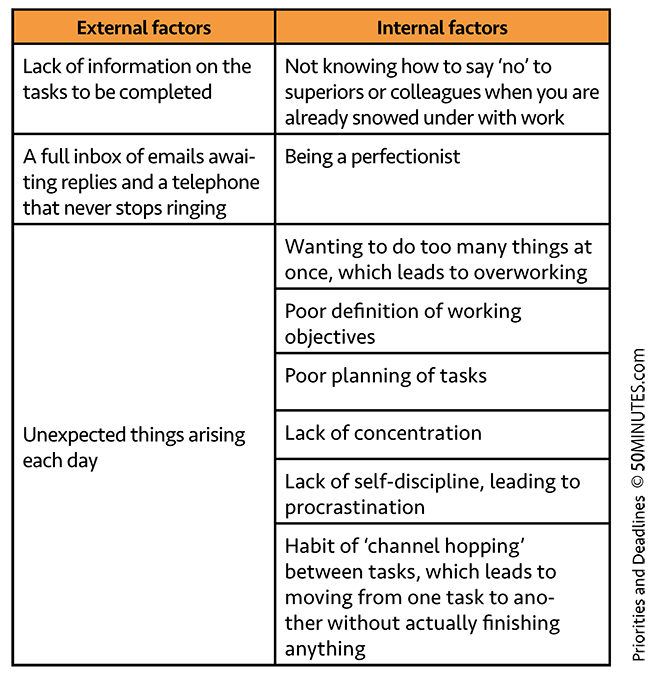
Extra information: avoid the channel hopping effect
Conditioned by the habits of a fussy and impatient television viewer, in many circumstances we tend to indulge in a form of channel hopping, where we continually change tasks or topics without bothering to finish what we started. In the evening, from the comfort of our own couch, it is up to us to make that choice, changing channels because we dislike the program or because we want to avoid watching yet another advertisement. In our professional lives, however, this channel hopping has the consequence of allowing us to accumulate a series of unfinished tasks which snowball and eventually avalanche into a series of imminent deadlines. Here are some resolutions you should make:
- If I start a task, I will finish it;
- When I finish a task, I will organise and file my documents;
- I will sort through my documents and throw away those that dont need to be kept;
- When I receive instruction or I think a task is important to perform, I will make a note of it directly;
- If I have any doubts regarding information or procedures, I will immediately ask;
- As soon as I have finished my work day, I will tidy my desk and prepare the materials needed for the following day.
Although we cannot influence external factors, there is some general advice that you can follow: try to minimise disruption from new technologies as much as possible. When the opportunity arises, log off from your email and turn off your mobile to concentrate entirely on your task, as this will save you valuable time.
Internal factors depend primarily on how we operate. It is up to each of us to identify the things that disrupt our work, in order to make every effort to overcome them. Now, write down the elements that distract you daily. The act of writing them down is essential to allowing the factors to materialise and to finally identifying the cause.
Problems of inaction
Entrenched in our way of working, along with our bad habits, there are mechanisms that make us passive and inefficient. These are problems of inaction. Roger Moyson, an American trainer and consultant, identifies three varieties, with each person being mostly affected by one of the three.
- Agitation: This state occurs when our attention tends to be distracted by activities on the sidelines of our focus, sometimes completely unrelated, and this slows our pace of work. People who react in an agitated way towards the activity tend to want to prove to others, but mostly to themselves, that they are good workers. However, running around the task instead of getting on with it is more likely to lead to them not finishing the task on time.

